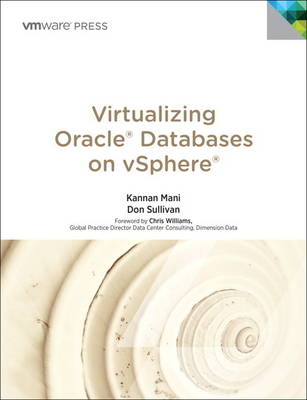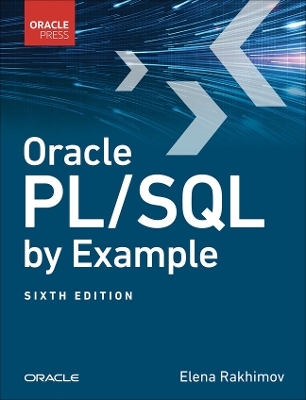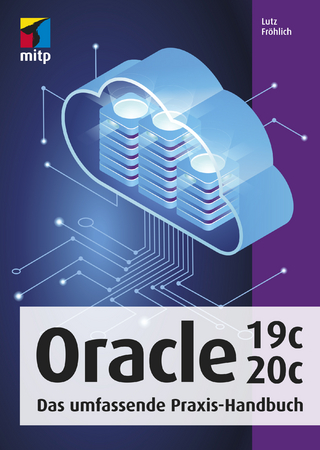
Virtualizing Oracle Databases on vSphere
VMWare Press (Verlag)
978-0-13-357018-2 (ISBN)
- Keine Verlagsinformationen verfügbar
- Artikel merken
Virtualizing large-scale Oracle software and databases on vSphere can deliver powerful scalability, availability, and performance benefits. Recognizing this opportunity, thousands of organizations are moving to virtualize Oracle. However, reliable best practices have been difficult to find, and database and virtualization professionals often bring incompatible perspectives to the challenge.
Virtualizing Oracle (R) Databases on vSphere (R) is the first authoritative, comprehensive, and best-practice guide to running Oracle on VMware platforms. Reflecting a deep understanding of both Oracle and vSphere, this guide is supported by extensive in-the-field experience with the full spectrum of database applications and environments. Both a detailed reference and a practical cookbook, it combines theory and practice, and offers up-to-date insights for the entire lifecycle, supported by case studies.
Kannan Mani and Don Sullivan fully address architecture, performance, design, sizing, and high availability. Focusing on current versions of Oracle and vSphere, they highlight the differences between ESX/ESXi 4.x and 5.x wherever relevant. To deliver even more value, they provide extensive online resources, including easy-to-adapt scripts and expert how-to videos.
Coverage includes:
Understanding the DBA's expanded role in virtualized environments, and the emergence of the vDBA, vRACDBA, and Cloud DBA
Identifying your best opportunities to drive value from virtualizing Oracle
Anticipating challenges associated with virtualizing Oracle-based Business Critical Applications on vSphere
Using VMware to overcome ongoing database deployment and management problems
Protecting your virtualized database environment with vSphere's high-availability capabilities
Designing databases to achieve scalability on demand, maximize availability, consolidate servers, and improve compliance
Implementing best practices for memory, storage, and database layout
Demystifying the impact of virtualization on Oracle support and licensing
Using VMware Site Recovery Manager (SRM) to accelerate disaster recovery by seamlessly integrating VM and storage failover
Streamlining provisioning and taking advantage of opportunities to automate
Kannan Mani (@kantwit) is currently a Staff Architect - Oracle Solutions for VMware. Kannan has been with VMware for more than 4 years, involved in developing and architecting business critical Oracle solutions on VMware platforms, and helping customers and partners successfully virtualize Oracle on VMware vSphere platform globally. Kannan was previously Reference Architecture Specialist at NetApp, where he architected and developed Oracle solutions on NetApp Storage. Prior to NetApp, Kannan was an Architecture Specialist at Unisys, where he led Oracle Center of Excellence. Kannan is the domain expert in Oracle technologies on various platforms (Storage and Virtualization) and published numerous customer-facing technical documents on Oracle and Database technologies. Kannan has over 17 years in the IT industry experience, and his expertise includes Oracle Real Application Clusters (RAC), Automatic Storage Management (ASM), clustering, customer relationship management (CRM), enterprise resource planning (ERP), business intelligence, performance and scalable enterprise architectures, benchmark and performance, technical solutions marketing and management, virtualization, and Cloud solutions. Kannan is a regular speaker at IOUG, VMworld, VMware Partner Exchange, Oracle Open World, EMC World, NetApp Insight, SNIA, and he is also an evangelist of Oracle technologies. Kannan has been recognized by Oracle as an Oracle ACE, and by VMware as CTO Ambassador and vExpert. Kannan holds a Master's degree in Computer Applications and a Master's degree in Business Administration focused on technology. Don Sullivan, an Oracle Certified Master, a vExpert, and a VMware CTO Ambassador joined VMware in June of 2010 as a Systems Engineer Database Specialist and Oracle Solution Architect for the entirety of the Americas. In that capacity, he has worked with numerous customers and partners focused on the proposition of running Oracle, SQL, and other high-workload systems on vSphere. Presently, the Product Line Marketing Manager for Business Critical Applications at VMware, Don is a frequent speaker at conferences focused on databases and virtualization. After finishing his Master's thesis at Arizona State University in 1996, Don focused on logical database design with Sybase TxSql, and he moved to Denver to work as a contract DBA. Don subsequently worked for AT&T as a contract DBA with both Sybase and Oracle. In 1998, he joined Oracle and Oracle University and became a Senior Principal Instructor for Oracle University, focusing on server products. He taught all server-based classes for 6 years, which included all New Features classes, OPS/RAC, Backup & Recovery, Performance Tuning, SQL Tuning, Data Guard, and the Data Server Internals (DSI) classes from 7.3 through 10g. He is a co-author of the Oracle Certified Master Practicum, and he is an original Oracle Certified Master. He also co-authored a performance-tuning class text for MySQL. In 2004, he became a consultant with Oracle's Advanced Technology Services (ATS) and spent the next 18 months involved in a number of proofs of concept (POCs) and other post-sales engagements. In 2005, Don joined Polyserve Corporation as the primary customer-facing Oracle Solution Architect. Although his role was primarily pre-sales, he was involved with all Polyserve customers who had Oracle implementations at every step of their implementation, both pre- and post-sales. In 2007, Polyserve was acquired by HP, and he stayed with HP. In that capacity, Don spent the majority of 2009 through 2013 delivering seminars and workshops to large customer groups focused on Oracle over Network File System (NFS). In 2010, Don joined VMware as a customer-facing Systems Engineer Database Specialist with both Sales and later PSO. In addition, Don is also a project manager for many projects to include cross-corporate functional stress tests. Finally, Don manages the virtualizing applications sub-track at VMworld and VMware's series of select database workshops.
Foreword xv
Introduction xix
About the Authors xxiii
Acknowledgments xxv
About the Reviewers xxix
Chapter 1 Introduction to Oracle Databases on Virtual Infrastructure 1
Virtualization with ESXi and vSphere and the Software-Defi ned Datacenter 3
Virtualizing Oracle Databases on vSphere: Benefi ts and Examples 7
Oracle Databases and DBA Fundamentals 8
Understanding Oracle Database Architectures 11
Summary 12
Chapter 2 Virtualization and High-Performance Oracle Workloads 15
Virtualized Oracle Environments on vSphere Key Benefi ts 15
Consolidating Platforms to Reduce Datacenter Costs 17
Enhancing Database Availability and Cost-Effective Disaster Recovery 19
Provisioning Rapid and New Database Server Environments 21
Reducing Planned Downtime with Migration of Live Oracle Database Servers 22
Guaranteeing Resources in a Shared Environment 23
Achieving IT Compliance 24
Zeroing In on Key Trigger Events 24
Solving Oracle Database Deployment and Management Issues Using VMware 25
Implementing Dynamic Oracle Datacenter Resource Management 26
Minimizing Server Sprawl 27
Meeting SLA Demands for Database Performance, Availability, and Disaster Recovery 27
Supporting a Dynamic Business Environment 27
Minimizing License Costs 28
Maximizing Oracle Workloads and Sizing 28
Option 1: Sizing the Oracle DB Workload 30
Option 2: Sizing the Oracle DB Application Vendor Recommendations 32
Option 3: Sizing Oracle DB Server Vendor Guidelines 35
Testing the Limits: Performance Studies and Stress Tests 36
Summary 36
Chapter 3 Oracle Databases and Applications in Virtual Infrastructure: Architectural Concepts 37
VMware ESXi Hypervisor 38
Designing Databases on VMware 41
Designing for Scalability on Demand 42
Designing for High Availability 44
Maintaining Compliance 48
Consolidating Database Servers 48
Virtualizing Oracle RAC 51
Identifying Key Stakeholders 53
Summary 54
Chapter 4 Oracle on vSphere Best Practices 55
Implementing ESX Host Best Practices 57
Maximizing Performance Using BIOS Settings 58
Operating System Processes 59
Upgrading the Version of ESX/ESXi and vSphere 60
Maximizing Support for a Hardware-Assisted Memory Management Unit 61
Implementing Memory-Related Best Practices 61
Supporting Large Pages 64
Implementing Compute (vCPU)-Related Best Practices 65
Confi guring Storage-Related Best Practices 68
Categorizing Storage Virtualization Technologies 71
Understanding Storage Protocol Capabilities 71
Understanding Database Layout Considerations 73
Comparing VMFS to RDM: Performance and Functionality 76
Networking Guidelines 78
Monitoring Performance on vSphere 79
Timekeeping in Virtual Machines 81
Summary 82
Chapter 5 Oracle Database High Availability: Planned and Unplanned Downtime 83
Protecting the Virtualized Environment with vSphere High Availability 84
Protecting Applications with vSphere and Symantec AppHA 86
Understanding Oracle RAC in Virtual Machines 88
Implementing Oracle RAC One Node 88
Implementing Multinode RAC 90
Deploying Oracle RAC on vSphere 92
Protecting Oracle Databases Against Downtime 98
Transitioning RAC Nodes Between Hosts Using VMware vMotion 100
To RAC or Not to RAC 103
Summary 104
Chapter 6 Performance Workload and Functional Stress Test Studies 105
Oracle Single-Instance Workload Study 106
Test Methodology 106
Test Result Details 109
Oracle RAC Workload Characterization Study 121
vMotion and VMware HA 121
Large-Scale Order Entry Benchmark Kit (Swingbench) 122
Architecture 123
Network Confi guration 125
Oracle RAC Installation Overview 130
24-Hour Workload Test 131
Oracle RAC Node vMotion Test 132
Mega vMotion-RAC Functional Stress Test 135
Summary 139
Chapter 7 Support and Licensing 141
Contemplating Oracle Software Support and Licensing 141
Understanding Oracle Certifi cation and Support for VMware Environments 143
Certifi cation of Oracle on VMware vSphere 144
Licensing Oracle 147
Advising VMware Customers 149
Summary 154
Chapter 8 Performance Management and Monitoring 155
Performance Management Terminology 157
The Role of the DBA in Performance Management 158
Processing Power: CPU or vCPU 159
CPU Ready Time (%RDY) 162
Memory 164
System Huge Pages 167
Transparent Page Sharing 172
Non-Uniform Memory Access 172
Networking 175
Network Load Testing 176
Dropped Packets 177
Storage Confi guration and Utilization 181
SCSI Queues 182
NFS Storage 185
Storage Access Latency 187
Spindle Busy Average 190
Understanding SCSI Queue Depth on an ESX/ESXi Host and Virtual Machine 191
Storage Path Throughput 192
Storage Benchmarking VMDK 193
Benchmarking and Ongoing Maintenance 197
Iometer 198
Oracle ORION 203
Comparing Storage Types 219
Block Alignment 220
Using pvSCSI and LSI Controllers 222
ASM Is Comparable to an LVM 225
Understanding the Oracle Enterprise Manager vCOPS Adapter 228
Using Oracle Database Server Metrics 230
Installing Oracle Enterprise Manager Adapter 232
Validating the OEM Adapter 233
Creating Oracle Database Custom Dashboard 233
Confi guring a Metric Graph (Rollover View) Widget 235
Confi guring a Generic Scoreboard Widget 235
Finalizing the Oracle Database Dashboard 236
Summary 239
Chapter 9 Business Continuity and Disaster Recovery 241
VMware vCenter Site Recovery Manager 243
vSphere Replication 245
Storage Array-Based Replication 247
Storage Replication Adapters 247
Application-Based Replication 248
Oracle Data Guard 248
Repairing Logical Data Block Corruption with Oracle Data Guard 249
Combining vSphere Replication and Data Guard 250
Testing SRM vSphere Replication 251
Using Storage Array-Based Replication with vSphere 253
Virtual Provisioning for Oracle ASM Disk Groups 255
Solution Findings 256
Creating a Disaster Recovery Plan 257
Confi gure Connections 257
Break the Connection 257
Export System Logs 257
Using Array-Based Replication 258
Summary 264
Chapter 10 Backup and Recovery 267
Backup and Recovery Principles 269
Backing Up Data Using In-Guest Software Solutions 270
Oracle Database Backup Methods 270
Classic Oracle Database Backups 270
Listing of Storage Vendor Backup Tools 272
Other Backup Tools 273
Storage Vendor Backup Solutions 273
Working with NetApp Backup Solutions 274
NetApp Backup and Restore Solution Overview 274
Integrating NetApp with vSphere 274
Working with NetApp Snapshot 275
Backing Up a Virtualized Oracle Database with NetApp Snapshot 275
Tools Available for Backups of Oracle Using NetApp 276
Step-by-Step Solution for Backing Up a Virtualized Oracle Database with NetApp Storage and NFS Datastores 277
Restoring a Database Using NetApp Snapshot 277
Backup and Restore Use Case with Snap Creator 278
EMC Avamar Backup and Restore Solution Overview 279
Backing Up the Oracle Database 280
Restoring the Oracle Database 281
VMware Data Protection Advanced 281
Comparing VMFS and RDM 282
Backups 283
Understand the Functionality of VMFS Versus RDMs 283
Oracle Data Guard for Backup 284
Oracle Database Backup Strategy Matrix 286
Summary 286
Chapter 11 Provisioning and Automation 289
Migrating Oracle Database from a Physical to Virtual Environment 291
Viewing Oracle Migration from a Physical to Virtual Solution 293
Facilitating Deployments 294
Understanding the Business Scenario 294
Lab Architecture 295
Migrating Oracle Database from Physical to Virtual 296
Confi guring Application Blueprints Using vCAC 302
Building a Database-as-a-Service Platform 311
Listing the Benefi ts of DBaaS 312
Allocating Storage as Part of the DBaaS Paradigm 313
Choosing the Components of a DBaaS Architecture 313
Summary 314
Chapter 12 Case Studies 317
Indiana University 318
American Tire Distributors 320
EMC Information Technology 321
Green Mountain Power 323
The Idaho Supreme Court 324
The University of British Columbia 326
VMware Information Technologies 327
So Many Others 330
Working with Events 330
Summary 332
Book Conclusion 332
TOC, 9780133570182, 9/26/2014
| Reihe/Serie | VMware Press Technology |
|---|---|
| Verlagsort | NJ |
| Sprache | englisch |
| Maße | 179 x 231 mm |
| Gewicht | 612 g |
| Themenwelt | Informatik ► Datenbanken ► Oracle |
| Mathematik / Informatik ► Informatik ► Netzwerke | |
| ISBN-10 | 0-13-357018-5 / 0133570185 |
| ISBN-13 | 978-0-13-357018-2 / 9780133570182 |
| Zustand | Neuware |
| Haben Sie eine Frage zum Produkt? |
aus dem Bereich


